Introduction: In this article, Melissa Davenport Berry describes the rousing adventure of William Pepperrell of Maine. Melissa is a genealogist who has a blog, AnceStory Archives, and a Facebook group, New England Family Genealogy and History.
“The Bourbon lilies, green and old,
That flaunted once in burnished gold;
The oriflamme of France that fell
That day when sunburned Pepperrell
His shotted salvos fired so well,
The Fleur de Lys trailed sulky down,
And Louisburg was George’s town.”–Edward Everett Hale “The Old South Picture Gallery”
The above poem celebrates New England’s new crusader, Sir William Pepperrell (1696-1759). He was dubbed “the hero of Louisburg” for leading the 1745 expedition that captured the French garrison at the Fortress of Louisburg, the capital of the French province of Île-Royale (now present-day Cape Breton Island, Canada).
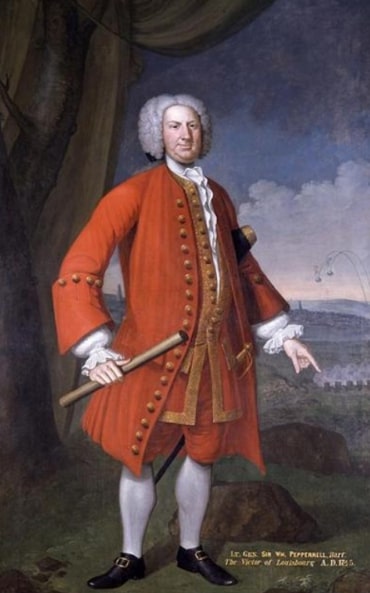
The fighting in North America between England and France is known as King George’s War (1744-1748).
After the French surrender, there was a festive spree that began at Long Wharf in Boston and ended in York, Maine. To understand the big benders that took place, here is some background and a few anecdotes.
I found a series of advertisements from the Old Pepperell [variant spelling of Pepperrell] Spring Water Company paying homage to William Pepperrell. This advertisement from the Evening Bulletin described Pepperrell’s return after the great victory at Louisburg.
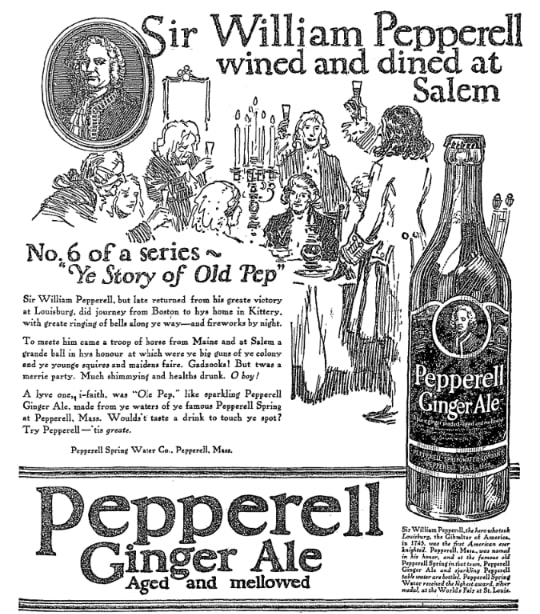
The ad’s text stated:
Sir William Pepperell, but late returned from his greate victory at Louisburg, did journey from Boston to hys home in Kittery, with greate ringing of bells along ye way – and fireworks by night.
To meete him came a troop of horse from Maine, and at Salem a grande ball in hys honour, at which were ye big guns of ye colony and ye younge squires and maidens faire. Gadzooks! But ’twas was a merrie party. Much shimmying and healths drunk! O boy!
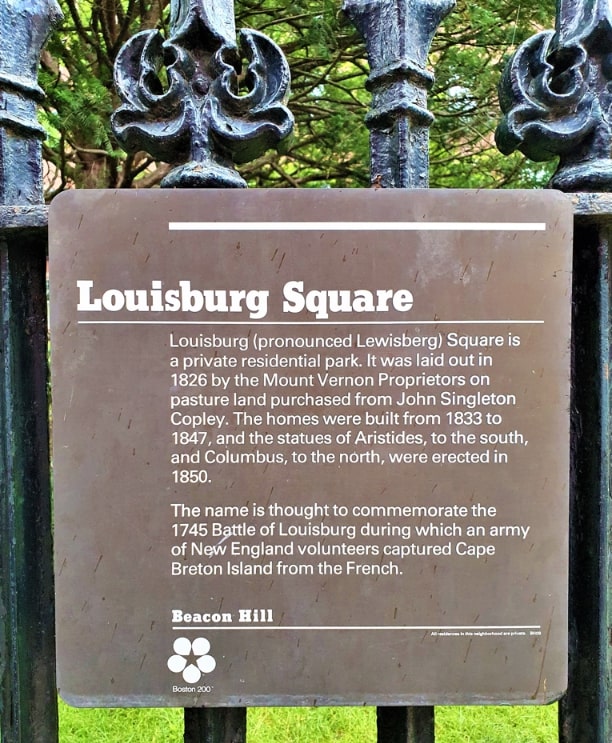
Once again, I call upon Edward Rowe Snow, historian and Flying Santa, to fill in some background. A question submitted to Snow in the Patriot Ledger from a reader asked: “Why is Louisburg Square [in Boston’s Beacon Hill neighborhood] so named?”
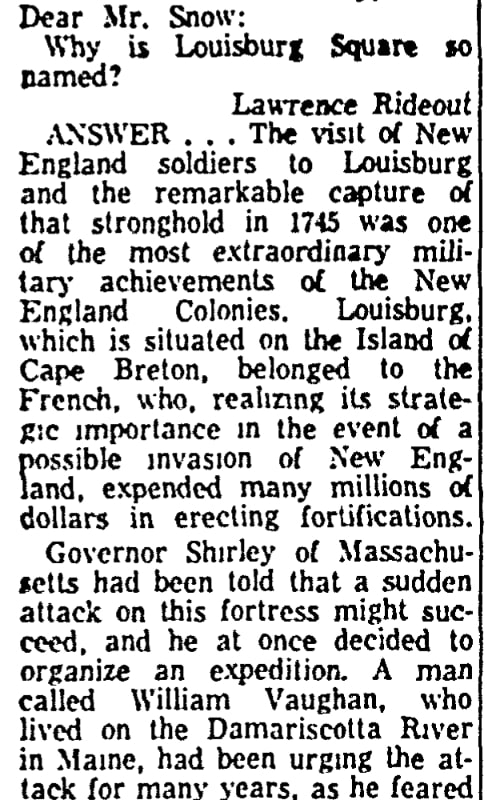
Snow answered:
The visit of New England soldiers to Louisburg and the remarkable capture of that stronghold in 1745 was one of the most extraordinary military achievements of the New England Colonies. Louisburg, which is situated on the Island of Cape Breton, belonged to the French, who, realizing its strategic importance in the event of a possible invasion of New England, expended many millions of dollars in erecting fortifications.
Governor [William] Shirley of Massachusetts had been told that a sudden attack on this fortress might succeed, and he at once decided to organize an expedition. A man called William Vaughan, who lived on the Damariscotta River in Maine, had been urging the attack for many years, as he feared that Louisburg might someday destroy his fish and lumber trade.
Shirley talked the question over with him and determined to bring his proposal before the legislature. He finally got a favorable decision by a majority of only one vote.
Massachusetts furnished 3,000 men, Connecticut [450] and New Hampshire 500, and Rhode Island loaned a ship-of-war. Col. William Pepperell of Kittery, Maine, was chosen to command the expedition, and Roger Wolcott of Connecticut was commissioned major-general and second in command.
Colonel Pepperell very much doubted the success of the enterprise, as he had only one 24-gun frigate and twelve small vessels. Governor Shirley appealed to England for assistance, and three ships were dispatched but did not arrive until after Colonel Pepperell’s vessels had left. They joined the attacking force at Louisburg and furnished much aid.
The New Englanders effected a landing on the first of May and laid siege to the town at once. Vaughan on the next day led 400 men back of the hills where he succeeded in setting on fire some naval stores, Nearby the French had a battery of 30 guns, and when the defenders saw the clouds of smoke they became panic-stricken and fled without firing a shot.
Vaughan’s men, of course, took possession, turning the guns against their former owners. The capture of this battery was good fortune and helped to decide the fate of the fortress. In a few days some British vessels arrived and the combined forces prepared 1,000 scaling ladders for a grand attack.
The Frenchmen became discouraged at these preparations and surrendered on June 17.
The world could not believe that Louisburg had fallen. New England celebrated the event with great enthusiasm. Colonel Pepperell was made a baronet, the only native American who ever received this appointment.
Louisburg Square was named to commemorate this victory.
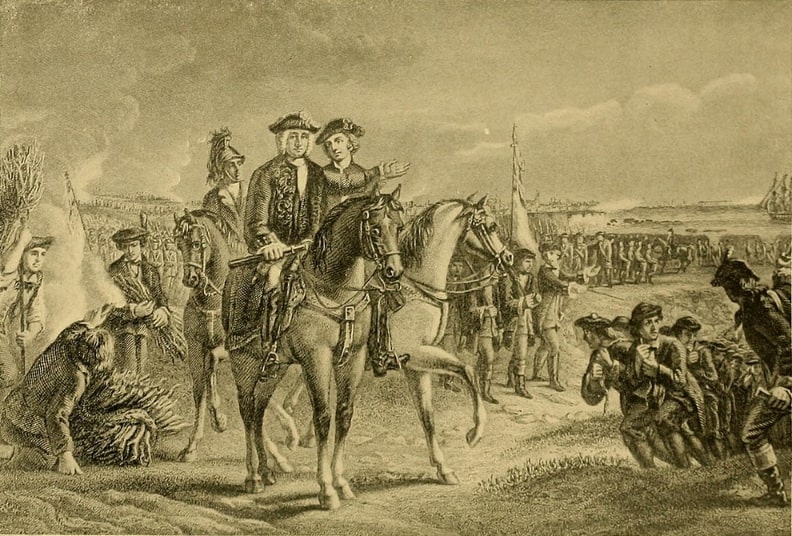
Before this venture, the reluctant Pepperrell consulted with his spiritual advisor and confidant, Rev. George Whitefield. If there was a “Merlin” to add to the New England annals, Whitefield surely fit the role.
According to the Congregational Journal, Whitefield called the project of capturing Louisburg a call from above.
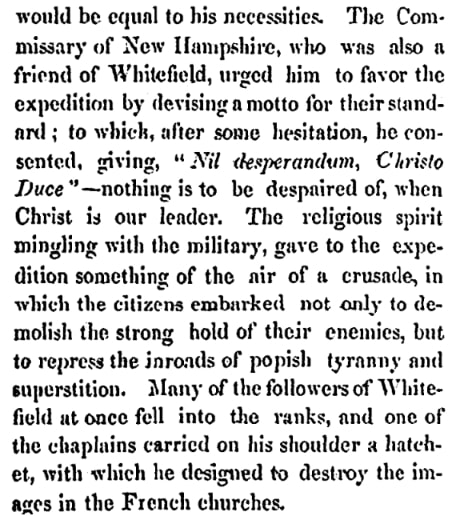
According to this article, Whitefield cautioned Pepperrell that:
…if he failed, he would be reproached by those he had made widows and orphans; and if he succeeded, he would encounter what was hardly less annoying, the envy of those who would attempt to obscure his glory. He should therefore go with “a single eye,” the simple conviction of duty, and then his strength would be equal to his necessities. The Commissary of New Hampshire, who was also a friend of Whitefield, urged him to favor the expedition by devising a motto for their standard; to which, after some hesitation, he consented, giving, “Nil desperandum, Christo Duce” – nothing is to be despaired of, when Christ is our leader. The religious spirit mingling with the military gave to the expedition something of the air of a crusade, in which the citizens embarked not only to demolish the stronghold of their enemies, but to repress the inroads of popish tyranny and superstition. Many of the followers of Whitefield at once fell into the ranks, and one of the chaplains carried on his shoulder a hatchet, with which he designed to destroy the images in the French churches.
The chaplain with the hatchet was Parson Samuel Moody, who at the time was 70 years old and ranked highest in age of all the crusader soldiers.
Pepperrell was also assisted by Royal Naval Officer Sir Peter Warren. According to sources, the green-eyed monster of envy reared its ugly face to ignite a power struggle between Pepperrell and Warren about who would govern the fortress.
Stay tuned…
Explore over 330 years of newspapers and historical records in GenealogyBank. Discover your family story! Start a 7-Day Free Trial
Note on the header image: Sir William Pepperrell House, Kittery Point, Maine. Credit: from an original postcard published by the Detroit Photographic Company, c. 1905; Wikimedia Commons.
